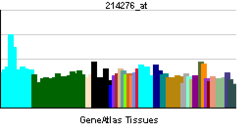KLF12
| View/Edit Human | View/Edit Mouse |
Krueppel-like factor 12 is a protein that in humans is encoded by the KLF12 gene.[3][4]
Activator protein-2 alpha (AP-2 alpha) is a developmentally-regulated transcription factor and important regulator of gene expression during vertebrate development and carcinogenesis. The protein encoded by this gene is a member of the Kruppel-like zinc finger protein family and can repress expression of the AP-2 alpha gene by binding to a specific site in the AP-2 alpha gene promoter. Repression by the encoded protein requires binding with a corepressor, CtBP1. Two transcript variants encoding different isoforms have been found for this gene.[4]
See also
References
- ↑ "Human PubMed Reference:".
- ↑ "Mouse PubMed Reference:".
- ↑ Roth C, Schuierer M, Gunther K, Buettner R (Jul 2000). "Genomic structure and DNA binding properties of the human zinc finger transcriptional repressor AP-2rep (KLF12)". Genomics. 63 (3): 384–90. doi:10.1006/geno.1999.6084. PMID 10704285.
- 1 2 "Entrez Gene: KLF12 Kruppel-like factor 12".
Further reading
- Imhof A, Schuierer M, Werner O, et al. (1999). "Transcriptional regulation of the AP-2alpha promoter by BTEB-1 and AP-2rep, a novel wt-1/egr-related zinc finger repressor". Mol. Cell. Biol. 19 (1): 194–204. PMC 83878
 . PMID 9858544.
. PMID 9858544. - Zhang QH, Ye M, Wu XY, et al. (2001). "Cloning and functional analysis of cDNAs with open reading frames for 300 previously undefined genes expressed in CD34+ hematopoietic stem/progenitor cells". Genome Res. 10 (10): 1546–60. doi:10.1101/gr.140200. PMC 310934
 . PMID 11042152.
. PMID 11042152. - Schuierer M, Hilger-Eversheim K, Dobner T, et al. (2001). "Induction of AP-2alpha expression by adenoviral infection involves inactivation of the AP-2rep transcriptional corepressor CtBP1". J. Biol. Chem. 276 (30): 27944–9. doi:10.1074/jbc.M100070200. PMID 11373277.
- Zhu CH, Huang Y, Broman MT, Domann FE (2001). "Expression of AP-2 alpha in SV40 immortalized human lung fibroblasts is associated with a distinct pattern of cytosine methylation in the AP-2 alpha promoter". Biochim. Biophys. Acta. 1519 (1–2): 85–91. doi:10.1016/s0167-4781(01)00227-5. PMID 11406275.
- Chen C, Brabham WW, Stultz BG, et al. (2001). "Defining a common region of deletion at 13q21 in human cancers". Genes Chromosomes Cancer. 31 (4): 333–44. doi:10.1002/gcc.1152. PMID 11433524.
- Rozenblum E, Vahteristo P, Sandberg T, et al. (2002). "A genomic map of a 6-Mb region at 13q21-q22 implicated in cancer development: identification and characterization of candidate genes". Hum. Genet. 110 (2): 111–21. doi:10.1007/s00439-001-0646-6. PMID 11935316.
- Strausberg RL, Feingold EA, Grouse LH, et al. (2003). "Generation and initial analysis of more than 15,000 full-length human and mouse cDNA sequences". Proc. Natl. Acad. Sci. U.S.A. 99 (26): 16899–903. doi:10.1073/pnas.242603899. PMC 139241
 . PMID 12477932.
. PMID 12477932. - Ota T, Suzuki Y, Nishikawa T, et al. (2004). "Complete sequencing and characterization of 21,243 full-length human cDNAs". Nat. Genet. 36 (1): 40–5. doi:10.1038/ng1285. PMID 14702039.
- Dunham A, Matthews LH, Burton J, et al. (2004). "The DNA sequence and analysis of human chromosome 13". Nature. 428 (6982): 522–8. doi:10.1038/nature02379. PMC 2665288
 . PMID 15057823.
. PMID 15057823. - Gerhard DS, Wagner L, Feingold EA, et al. (2004). "The status, quality, and expansion of the NIH full-length cDNA project: the Mammalian Gene Collection (MGC)". Genome Res. 14 (10B): 2121–7. doi:10.1101/gr.2596504. PMC 528928
 . PMID 15489334.
. PMID 15489334. - Rual JF, Venkatesan K, Hao T, et al. (2005). "Towards a proteome-scale map of the human protein-protein interaction network". Nature. 437 (7062): 1173–8. doi:10.1038/nature04209. PMID 16189514.
- Kimura K, Wakamatsu A, Suzuki Y, et al. (2006). "Diversification of transcriptional modulation: large-scale identification and characterization of putative alternative promoters of human genes". Genome Res. 16 (1): 55–65. doi:10.1101/gr.4039406. PMC 1356129
 . PMID 16344560.
. PMID 16344560. - Suda S, Rai T, Sohara E, et al. (2006). "Postnatal expression of KLF12 in the inner medullary collecting ducts of kidney and its trans-activation of UT-A1 urea transporter promoter". Biochem. Biophys. Res. Commun. 344 (1): 246–52. doi:10.1016/j.bbrc.2006.03.138. PMID 16615998.
External links
- KLF12 protein, human at the US National Library of Medicine Medical Subject Headings (MeSH)
This article incorporates text from the United States National Library of Medicine, which is in the public domain.


